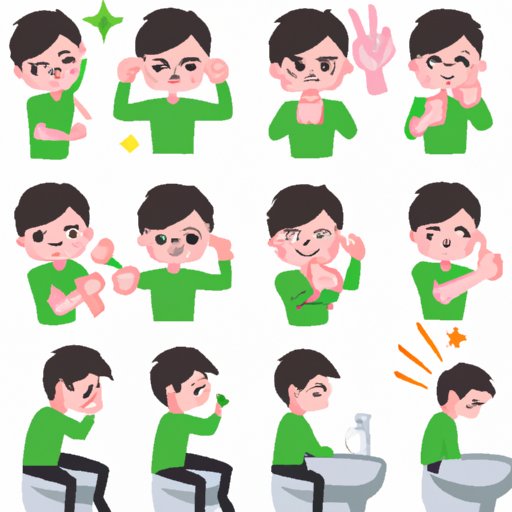
Introduction
When it comes to exercise, we often focus on the physical benefits – from increased strength to weight loss. However, one topic that doesn’t get enough attention is the connection between exercise and bowel movements. The question on everyone’s mind is, does exercise make you poop? In this article, we’ll explore the science behind exercise and bowel movements, the benefits of regular movements, different types of exercise and their effects on bowel movements, and more.
The Science Behind Exercise and Bowel Movements: What You Need to Know
To understand the connection between exercise and bowel movements, it’s helpful to know how the digestive system works. After we eat, food travels through the digestive system, where it’s broken down and nutrients are absorbed. The leftover waste, or stool, passes through the large intestine and rectum, where it’s stored until it’s time to be eliminated.
Exercise plays a crucial role in digestion by increasing blood flow to the digestive system, which helps food move more quickly through the system. Exercise also stimulates the muscles in the intestines, helping to move stool along and promoting regularity.
Does Your Workout Move Things Along? The Connection Between Exercise and Regularity
Regular bowel movements are essential for overall health and comfort. Constipation, or infrequent bowel movements, can cause discomfort, bloating, and even more serious health issues in the long term. Exercise is one way to promote regular bowel movements.
Studies have shown that exercise can help move stool through the colon more quickly, reducing the risk of constipation. Additionally, exercise stimulates the natural contractions of the muscles in the intestines, which can encourage a bowel movement.
Different types of exercise can have different effects on bowel movements. Low-intensity exercise, such as walking or yoga, can help promote regularity. However, high-intensity exercise, such as running or CrossFit, can actually cause loose stools. We’ll talk more about this later.
Breaking the Stigma: Why Talking About Exercise and Pooping Matters
Despite the importance of regular bowel movements, many of us are uncomfortable talking about this topic. Bowel movements are often considered a private matter, and many people feel embarrassed to discuss them, even with their doctor.
However, breaking the stigma around bowel movements and discussing this topic openly can lead to better health outcomes. When we’re open about our bowel movements, we can identify issues like constipation or diarrhea early on and take steps to address them. Additionally, if we’re experiencing digestive issues, sharing this information with our doctor can help them determine the cause and provide appropriate treatment.
5 Exercises That Can Help With Constipation
Constipation is a common issue, affecting up to 20% of the population. If you’re experiencing constipation, exercise can be a helpful tool in promoting regularity. Here are five exercises that can help:
1. Walking: Low-intensity exercise like walking can help get things moving through the digestive system. Aim for a 20-30 minute walk every day to promote regular bowel movements.
2. Yoga: Certain yoga poses like the bridge pose or the seated twist can help stimulate the muscles in the abdomen and promote regularity.
3. Squats: Squats can help stimulate bowel movements by putting pressure on the rectum. Try doing a few squats before going to the bathroom.
4. Abdominal Massage: Massaging the abdomen can help stimulate the muscles in the intestines and promote regular bowel movements. Use gentle, circular motions for a few minutes each day.
5. Cycling: Cycling can be an effective way to get the bowels moving. Try cycling for 30 minutes a day to promote regularity.
The Connection Between High-Intensity Exercise and Loose Stools
While exercise can be a helpful way to promote regular bowel movements, high-intensity exercise can actually cause loose stools. This is because high-intensity exercise can activate the body’s fight-or-flight response, which can slow digestion and lead to loose stools. Additionally, dehydration during high-intensity exercise can also lead to loose stools.
To prevent loose stools during high-intensity exercise, it’s important to stay hydrated and avoid eating a large meal before working out. Start with low-intensity exercise and gradually increase the intensity to give your body time to adjust.
Is Exercise Enough? A Look at Diet and Lifestyle Factors for Healthy Bowels
While exercise is an important factor in promoting healthy bowel movements, it’s not the whole picture. Diet and lifestyle factors also play a crucial role in bowel health.
Aim to eat a diet rich in fiber, as fiber helps move stool through the digestive system. Additionally, stay hydrated and get enough rest to promote healthy bowel movements. Supplements like magnesium and probiotics can also be helpful in promoting regularity.
The Unexpected Benefits of Exercising Your Pelvic Floor: Improved Digestion and More
The pelvic floor is a group of muscles that supports the bladder, uterus, and rectum. A strong pelvic floor can help improve digestion by supporting the organs involved in digestion and promoting regular bowel movements.
Exercises like Kegels can help strengthen the pelvic floor muscles. To do Kegels, simply squeeze the muscles you would use to stop the flow of urine. Hold for a few seconds, then release. Repeat several times a day for best results.
Conclusion
Regular bowel movements are an essential part of overall health, and exercise can be a helpful tool in promoting regularity. By understanding the science behind exercise and bowel movements, breaking the stigma around discussing this issue, and incorporating exercises and lifestyle changes that promote healthy digestion, we can lead healthier, more comfortable lives.





